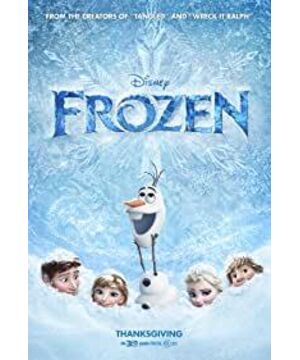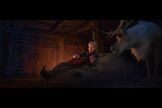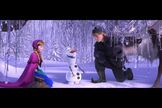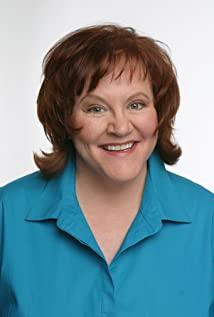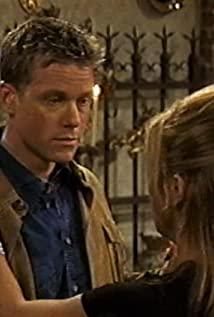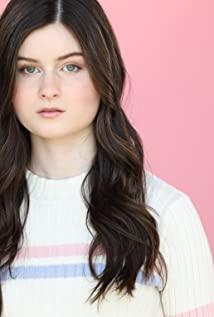The most important task of soundtrack in movies is to set the atmosphere and mobilize emotions. In this regard, it often has more advantages than pictures and dialogues. Different from pure movie soundtracks, the music in musicals appears in a more "active" form. It allows the characters to participate in the music, and the emotions expressed in this way are multiplied and more touching.
This cartoon, which presents sisters' love in a modern fable style, fully combines the charming charm of Broadway musicals with the magnificence of fairy tale movie music in music and song production. Every track included in the film is a classic, and composers Robert Lopez and Kristin Anderson Lopez for the film's singing section have an impressive and active narrative for the film. Serve. From the brief and powerful opening of the ice-picking horn Frozen Heart; to the Sami aria Vuelie explaining the environment; Anna's intense excitement before the coronation contrasts with Isa's gloomy unease, and Anna finally finds Isa in the North Mountain after all the hardships and dangers. There are For The First Time In Forever; Anna Hans's love is An Open Door; Xuebao's debut track In Summer; Goblin's playful and cute Fixer Upper; Do You Want To Build A Snowman, which God edited the sisters' growth process; let it go, which won the best song at this year's Oscar; and so on. Every song and every piece of music can be taken out separately and savored for a long time. But trying to form a short and powerful text is really a little powerless.
So, since I'm just talking about the music, I wanted to jump out of the 90-minute movie itself and talk about the pieces on the Frozen Deluxe soundtrack that the composer wrote for the film but didn't end up being adopted.
The scene where Anna finally finds Isa in the Snow Palace. In the original design, the two sang Life's Too Short. Compared with For The First Time In Forever (Reprise) selected in the film, the rhythm is more cheerful and clear, the lively electric piano and drum beats, and the colloquial lyrics are typical Broadway jazz-style tracks. Ever since Xuebao brought back the two sisters' fond memories of childhood and put aside their former suspicions, Isa even happily welcomed Anna to stay and live together. But the final conflict between the two still comes from Aesa's unwillingness to return to Arendelle with Anna, on the grounds that "if you go back, you have to put on gloves again, just like being locked in a cage". Isa here seems to be exactly as she sang in let it go (let it go) when she fled from Arendelle and built her own ice castle. She completely let go of her fetters and released herself. He appeared firm and strong, without hesitation or wavering. And Anna is obviously full of shadows when she was repeatedly rejected by Isa in the process of growing up, so she is obsessed with: All you know is how to shut people out (all you know is how to shut people out) Shut out). There itis! The door you'd love to slam in my face (again, you always like to slam the door)! And in order to echo the previous article, the focus of the dispute returns to You're a fool who married a stranger (you are a fool who married a stranger). At this point, the whole song has changed from "Life's too short to miss out on a sister like you" to "I've been so wrong about you" You) Life's too short to even have you in it (life is too short, I don't want you to appear in my life)", and then Anna affirmed that Aisha was the prophecy, and finally touched Aisha's rebellion and took the initiative to freeze Anna's heart (in the movie it's an accident).
In fact, I personally prefer this song. Whether it is from the style of the song and the narration of the lyrics, or the shaping of the characters, and the continuity of the development of the story, it is closer to the daily bickering and anger of any pair of sisters around us. . The only pity is that the point of the dispute in this song is not that Anna persuaded Isa to go back to thaw Arendelle, nor could it show Isa's shock and disappointment when she learned that the whole of Arendelle was frozen, resulting in repeated personality. , was once again occupied by unease and fear, which led to the climax of Anna Wen's life saving her sister, but gave priority to her own feelings and put the people of the city and the people behind her back. Of course, from this point of view, it really can't reflect the national responsibility and great love of the two princesses, which seems too petty. Director Chris Barker explained in the footage that they never intended Elsa and Anna to be part of Disney's "Princess franchise" in the first place, and the producers didn't put any pressure on them. "We ignored that and focused on the story," says writer Jennifer Lee. "We ended up making them princesses just to be more influential, because as royals, what they do affects more than just themselves. "Maybe for this reason, this part of the episode was finally replaced by For The First Time In Forever (Reprise), but unfortunately, Elsa was locked in the dungeon and Anna was about to freeze to death. The two finally began to truly understand each other. The variation version of this Life's Too Short (Reprise) also resulted in the reduction of the music in the middle and rear parts of the whole film.
Film is a visual art after all, even if it is full of Broadway-style musicals, the meaning of songs is not for show, but for narrative. It may also be because of these that the tracks that are finally adopted and put on the screen always feel that there is less room for imagination.
In the original setting, there is a song We Know Better (we know each other): a similar expression to Do You Want to Build a Snowman. 3-year-old Isa welcomes the newly born Anna - we are the expected princesses; they play and grow together, complain to each other in the process of being raised into an elegant and beautiful princess, those speechless little details, little girl Those cute little rebels, before Isa accidentally hurt Anna in childhood, the sisters grew up together and expressed their intimacy in a single song. Deleting this song will undoubtedly make the "we used to be so close" that Anna constantly emphasizes when arguing with Isa in the movie seems a little weak and far-fetched.
Before the coronation, there is a song about prophecy, Spring Pageant (Spring Feast), in the form of a rehearsal feast for the children of the choir to introduce the "oracle" about freezing and curses. This song is very casual, with almost no accompaniment. If it is put on the stage, it may be just a cutscene, but the music itself has a strong sense of picture, interspersed with children whispering, naughty, and teachers trying to correct mistakes and maintain The "voice-over" of the order is very lively and playful, and through a small scene, it depicts the atmosphere of the country's jubilant preparations for the coronation ceremony just right.
One of Anna's debut songs - More Than Just The Spare (not just a spare tire), in the original settings of many first drafts, the writers positioned the two sisters as Isa is the heir to the throne and Anna is just a neglected one. on the spare tire. This song is Anna's monologue, comparing herself with a horse's hoof, "Even if you are not valued, you must be a useful person." Of course the story we ended up seeing didn't highlight this setting. However, from this cut song, the character of Anna can indeed be better understood.
There is also a love song You're You (you are you) that Hans sings for Anna. It is a very gentle tune and a very pitiful emotion. It aims to express Hans' understanding of the straightforward Anna. If it develops according to this kind of plot , Maybe Anna and Hans are really true love (true love), but the Love Is An Open Door that is ultimately retained is more enthusiastic, which further expresses that Anna and Hans, who are also neglected in the royal family, finally find each other in the eyes of each other The joy of presence and love at first sight. To complain here, I think most people should be able to see that Anna and Hans are at best acquaintances of "the same world, why do they know each other when they meet", or just "He Yi is never tired of friendship, and intimate people are speculative. ” The love of each other, it is estimated that only this princess who lacks love can be foolishly confused. In my opinion, the prince, who has been completely blackened at the end of the play, can't help but hit Anna hard and say heartless words, which is really heartwarming.
These clipped tracks basically exist in the first half of the film. From the perspective of the film, in terms of the role of promoting the narrative, such a long song is really unnecessary, but as a hotbed for brewing emotions, a certain length is necessary. Yes, as the rhythm of the second half of the plot accelerates, the change of character image requires a solid foundation laid in the early stage to promote the rationality of its transformation, so as to make the characters more plump and agile. Of course, for those who pay attention to the soundtrack, the singing part of this film is already top-heavy enough, and if it is not cut, it may be more anticlimactic. Fortunately, the composer of the pure music part, Chris Barker, added some melodies of the singing songs to the soundtrack of the second half, thus ensuring the integrity and continuity of the whole soundtrack.
In short, just from the songs that were not adopted, it can be seen that this work was not easy to form. It is said that the project of "Snow Queen", the predecessor of "Frozen", can be regarded as a bumpy project. Although this project has been filed as early as more than ten years ago, it has experienced many setbacks in the process of formation - adaptation, visual effects, The social environment, the wait, caused the project to be put on hold again and again, and the production team went through a major shakeup, culminating in the team we see led by Chris Barker and Jennifer Lee. Two composers, Robert Lopez and Christine Anderson Lopez, also actively participated in the creation of the works. We are very pleased to see that because of their active cooperation, music becomes part of the narrative and guides the development of the story, not just as a tool to set off the atmosphere and mobilize emotions, which may be the reason why music in musicals surpasses other types of film scores. The uniqueness of it.
View more about Frozen reviews


